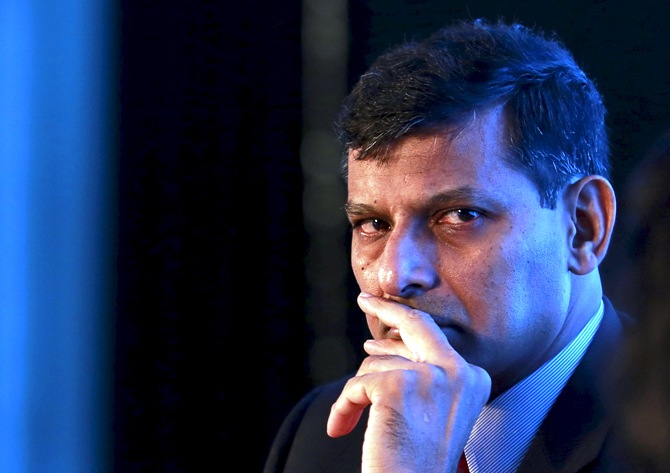'Discord between politicians and RBI governor is nothing new. It has happened on several occasions in the past'
'The most difficult challenge for the new RBI governor will be to check the fall of the rupee'

Raghuram Rajan’s decision to not seek a second term has drawn reactions from economists, policy-makers, market analysts as well as from members of civil society.
According to A K Prabhakar, head of research at IDBI Capital, image, below, Rajan's decision was a personal one triggered by the outcome of recent talks he had with the government.
In a conversation with Indrani Roy/Rediff.com, Prabhakar analyses why Rajan did what he did.
What is your opinion on Reserve Bank of India Governor Raghuram Rajan’s decision to opt out of a second term?
The letter in which Raghuram Rajan announced his decision not to continue as the Reserve Bank of India governor clearly indicates that he is ‘not too happy’ carrying out his duties as the RBI chief for a second term.
It is possible that after holding talks with the government he has come to the conclusion that it would not be comfortable for him to continue.
 Do you think the allegations by Bharatiya Janata Party nember of Parliament Subramanian Swamy prompted him to take this decision?
Do you think the allegations by Bharatiya Janata Party nember of Parliament Subramanian Swamy prompted him to take this decision?
(Pauses) Let’s not read too much into the political statements by Swamy.
Discord between politicians and RBI governor is nothing new. It has happened on several occasions in the past.
We haven’t forgotten disagreements that former RBI governor Y V Reddy used to have with the government.
Reddy deftly countered the attacks on him.
Hence, it will be unfair to think that someone like Rajan took such a crucial step following allegations pouring in from some quarter.
I think whatever controversy you are referring to was a minor one that was blown out of proportion by the media.
What is your opinion about Rajan as the RBI governor?
In my 23 years of career, Rajan is the most discussed personality after Manmohan Singh.
When Singh as finance minister liberalised the Indian economy in the early '90s, he hit the headlines.
Many praised his stance, many criticised him as well.
But no one could ignore him.
Ditto for Rajan.
In recent times, Rajan has been one of the most talked about personalities.
He was there on Twitter, Facebook, WhatsApp and every other conceivable social platform.
Many experts feel that Rajan did not cut rates as much as he should have.
A central bank chief has to abide by the rule book.
He cannot and should not play to the gallery.
There are many factors he needs to consider.
India has to consider supply side problems.
Unlike the West where people spend a lot, ours is a savings-oriented economy.
Here, inflation is a major issue.
We have a savings rate of 30 per cent and as the RBI governor, Rajan had to take care so that the interest rate did not come down drastically.
Too low an interest rate, according to my understanding, is not beneficial for the Indian economy.
All of Rajan's economic steps were quite predictable. There was hardly any hanky-panky ever.
As the RBI governor, whatever steps Rajan took were beneficial for the economy.
Do you think Rajan’s hard stand on banks’ non-performing assets irked some people in power?
One can never be sure about such matters.
I think Rajan may have sought some clarity from the government on some important economic issues and decided to step down when the answers he got were not too satisfactory.
Who do you think is the best suited to replace Rajan?
When we discussed Rajan’s exit in our banking circles, many were of the opinion that Reserve Bank of India Deputy Governor Urjit Patel would be the fittest person to replace Rajan.
What will be the main challenges before the new RBI governor?
I think the most difficult challenge for the new RBI governor will be to check the fall of the rupee. With US elections scheduled for November, the dollar is set to strengthen and the new RBI governor would need to take some drastic steps so that the rupee does not fall further.
"Reserve Bank of India Governor Raghuram Rajan's decision to not renew his term doesn't surprise me," says Professor Ajit Kumar Ray, image, below, who teaches commerce in North Bengal University.
In a candid conversation with Indrani Roy, Ray seems perturbed over the "political encroachment on individual liberties" that has become the "new normal" these days.
What do you think could have motivated Rajan to take this step?
The present situation in the country does not permit any independent soul to function properly.
We are witnessing political encroachment in every sphere.
The Reserve Bank of India, too, is no exception.
Raghuram Rajan knows his job and prefers to work independently.
That way, he has drawn the ire of some.
Look at what is happening in the universities now.
The Planning Commission is replaced by NITI Ayog.
The present government at the Centre wants its ‘yes men’ in every corner.
What is your opinion about Rajan as the RBI governor?
He did a fantastic job.
He was successful in controlling inflation to a great extent, was handling the grave issue of current account deficit with confidence and zeal.
Despite the global economic turmoil, India maintained a growth rate of 7 per cent on an average.
That’s really commendable.
Rajan brought in a healthy air of competition in the banking sector.
He was for new banks, small banks and payments banks.
I think he was a blessing for the Indian economy and had a lot more to give.
It’s really unfortunate that he is not having a second term.
But some experts think he is not in favour of too many rate cuts.
He has a clear stand on this -- he is not for a monetary policy that will result in a rise in inflation.
His motto has been to strike a balance between growth and inflation.
He believes in taking slow but steady steps.
Rajan was caught in a political crossfire. He was accused of not being ‘fully mentally Indian’ and also of acting as a ‘Congress agent’.
It’s the funniest argument I have ever come across.
As I said, the government at the Centre is too scared of independent minds.
I was shocked to read the reactions of Subramanian Swamy’s reaction over Rajan’s exit.
I think such comments are not only rude, insensitive but uncivilised as well.
Swamy not only maligned the image of the RBI governor but also that of the central bank, as well as that of the government.
After all, the RBI governor is appointed by the government.
What, according to you, was the bone of contention?
I think Rajan’s stand on non-performing assets irked many.
As the RBI governor, he has been asking banks to come clean on the state of NPAs.
We all know that too much stress on NPAs causes discomfort for many high profile businessmen.
Meaning?
Take the case of Vijay Mallya, for instance.
Soon after Rajan started his campaign against banks’ NPAs, the seriousness of Mallya case came out in the open and that may have ruffled quite a few feathers.
Who do you think would be the fittest replacement for Rajan?
I think Kaushik Basu, chief economist with the World Bank, would be Rajan’s fittest successor.
Nobody else can handle the Indian economy as it is at present.
Some experts believe State Bank of India chairperson Arundhati Bhattacharya could be a good replacement for Rajan.
I don't think so.
Bhattacharya is a banker, not an economist.
We need an economist to be at the helm of RBI.
 Economists fear a downslide in the stock markets now that Rajan has announced his exit from the RBI.
Economists fear a downslide in the stock markets now that Rajan has announced his exit from the RBI.
It is quite possible.
If people’s confidence in the economy is shaken, it is bound to reflect on the markets.
But I don’t think the effect will be long term.
What would be the main challenges before the new RBI governor?
The new RBI governor will have to take care of the following economic aspects at the earliest:
• Stabilising the rupee
• Controlling inflation
• Maintaining the current account deficit
• Maintaining the gross domestic product growth rate at 7%
• Controlling the current account deficit
Image (top): Raghuram Rajan. Photograph: Danish Siddiqui/Reuters











 © 2025
© 2025